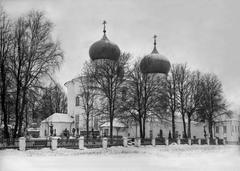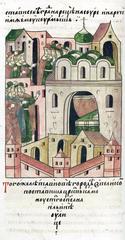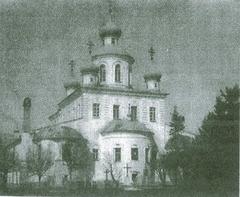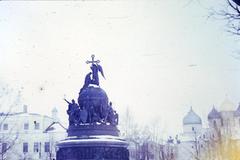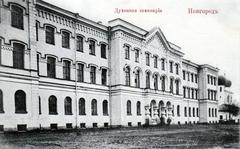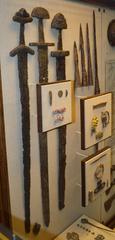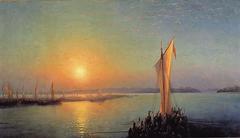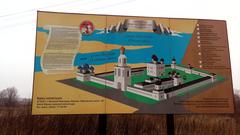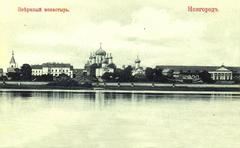
Drama Theatre Veliky Novgorod: Visiting Hours, Tickets, and History Guide
Date: 04/07/2025
Introduction
Nestled in the historic city of Veliky Novgorod, the Fyodor Dostoevsky Drama Theatre is a must-visit for lovers of architecture, history, and the performing arts. This comprehensive guide provides essential details on the theatre’s origins, architectural significance, visiting hours, ticketing, accessibility, and travel tips. Whether you are drawn by its Soviet modernist design, rich cultural programming, or proximity to other landmark sites, this resource will help you plan an unforgettable visit.
Table of Contents
- Introduction
- Origins and Architectural Vision
- Historical Significance and Community Role
- Visiting Information
- Current Repertoire and Artistic Direction
- Renovations and Modernization
- Nearby Attractions
- Language and Visitor Tips
- COVID-19 and Health Measures
- Frequently Asked Questions (FAQ)
- Conclusion and Call to Action
- References
Origins and Architectural Vision
Officially known as the Fyodor Mikhailovich Dostoevsky Drama Theatre, this iconic building was completed in 1987, designed by architect Vladimir Somov. It is a striking example of late Soviet modernism, featuring bold, sculptural forms, expansive glass facades, and white arches reminiscent of Orthodox church architecture (Hidden Architecture; The Calvert Journal). The design intentionally balances innovation with homage to the city’s ancient skyline, ensuring the theatre harmonizes with its historic surroundings.
The theatre’s placement along the Volkhov River preserves the medieval Kremlin’s silhouette, while its modernist bravado has sparked debate and admiration among critics and residents alike (The Calvert Journal). This combination of radical design and respect for local heritage underscores its status as one of Russia’s most significant public architecture achievements of the 20th century (ArchDaily).
Historical Significance and Community Role
The theatre’s roots trace back to 1853, when performances were first staged in Novgorod’s drawing rooms (Atlas Obscura). The current building marks the culmination of over a century of theatrical tradition, becoming a hub for drama, music, and community events. Named after Fyodor Dostoevsky, it is a beacon for classical Russian literature, contemporary drama, and cultural exchange.
The theatre serves as a cultural anchor, collaborating with schools, universities, and local organizations. It hosts festivals such as the annual “Slovisha” festival of musical antiquities, attracting participants from across Russia and Europe (European Proceedings). The ongoing modernization project by Rhizome further cements its role as a vibrant cultural cluster (World Architecture).
Visiting Information
Visiting Hours
- Box Office: Open daily from 11:00 to 19:00 (with an afternoon break). Hours may vary on holidays or during summer; always check the official website before your visit.
- Performance Times: Generally start at 18:00 or 19:00 on weekdays, with matinee shows on weekends and holidays at 14:00.
Ticketing and Booking
- Where to Buy:
- At the box office during opening hours
- Online via the official theatre website or trusted Russian ticket platforms
- Prices: Range from 300 to 1,500 RUB, depending on the production and seating category. Discounts are available for students, seniors, and groups. Early booking is advised for weekends and special events.
Accessibility and Visitor Amenities
- Physical Accessibility: Ramps, elevators, and accessible restrooms ensure comfort for visitors with disabilities.
- Visitor Amenities:
- Cloakroom: Free, staffed service for coats and bags
- Café: Serves refreshments before performances and during intermissions
- Souvenir Shop: Offers programs and memorabilia
- Free Wi-Fi in public areas
- Bilingual signage (Russian and English)
Guided Tours and Educational Programs
- Guided tours (primarily in Russian; English on request) explore the building’s architecture, history, and backstage areas.
- Educational workshops and masterclasses are held, especially during holidays and festivals. Advance booking is recommended for both.
Location and Transportation
- Address: Velikaya ulitsa, Veliky Novgorod, Russia
- Access:
- Centrally located near the Novgorod Kremlin and Millennium of Russia Monument
- Public buses and marshrutkas stop nearby
- Parking available for private vehicles
- Approximately 3 km from the railway station (short taxi or bus ride)
Cultural Etiquette
- Dress Code: Smart-casual or semi-formal attire is typical; formal dress for premieres and galas.
- Conduct: Arrive 20–30 minutes early. Latecomers may be seated only during intermissions.
- Photography: Prohibited during performances; permitted in lobbies and public spaces.
- Other: Mobile devices must be silenced; refreshments not allowed in the auditorium.
Current Repertoire and Artistic Direction
- Classical Drama: Works by Dostoevsky, Chekhov, Ostrovsky, and global classics (Shakespeare, Molière).
- Contemporary Theatre: Premieres of new Russian plays and adaptations of modern novels and films.
- Family and Youth Programming: Adaptations of Russian fairy tales and educational performances.
- Festivals and Special Events: “Novgorod Theatre Spring” and the “Slovisha” festival draw national and international participants.
Monthly schedules are published on the theatre’s official website.
Renovations and Modernization
- Restoration: Completed in late 2023, preserving the iconic façade and updating interiors for modern comfort.
- Technical Upgrades: Advanced lighting, sound systems, and stage technology support ambitious productions.
- Accessibility: Improved step-free access, elevators, and signage.
(ArchDaily; World Architecture)
Nearby Attractions
Maximize your cultural itinerary by visiting:
- Novgorod Kremlin
- Saint Sophia Cathedral
- Millennium of Russia Monument
- Yaroslav’s Courtyard
All are within walking distance and offer excellent photography opportunities (Culture Tourist).
Language and Visitor Tips
- Performance Language: Russian. Some international events offer English surtitles or printed synopses.
- Tips for Non-Russian Speakers: Read a synopsis or use translation apps for unfamiliar plays; visual storytelling aids comprehension.
COVID-19 and Health Measures
As of July 2025, the theatre follows health protocols with regular cleaning and hand sanitizers available. Mask policies align with local regulations; check the official website for the latest updates.
Frequently Asked Questions (FAQ)
Q: What are the Dostoevsky Drama Theatre visiting hours?
A: Box office is open 11:00–19:00; performances generally start at 18:00 or 19:00.
Q: How can I buy tickets?
A: At the box office or online.
Q: Is the theatre accessible for visitors with disabilities?
A: Yes, with ramps, elevators, and accessible restrooms.
Q: Are guided tours available?
A: Yes, primarily in Russian; English on request.
Q: What nearby sites can I visit?
A: Novgorod Kremlin, Saint Sophia Cathedral, Millennium of Russia Monument.
Conclusion and Call to Action
The Fyodor Dostoevsky Drama Theatre is a testament to Veliky Novgorod’s enduring cultural spirit—a place where architectural innovation meets artistic excellence. Whether you’re attending a renowned classic, a bold contemporary play, or exploring the grand modernist interiors, your visit will be enriched by the theatre’s dynamic role in the city’s heritage.
Plan your visit today:
- Check schedules and book tickets via the official theatre website.
- Download the Audiala app for guided audio tours and easy ticketing.
- Follow the theatre on social media for updates on performances, events, and festivals.
References and Further Reading
- Rhizome wins drama theater renovation in one of Russia’s oldest historic cities, 2020, ArchDaily
- Searching for old Russia: A guide to visiting Veliky Novgorod and Pskov, Culture Tourist
- Fyodor Dostoevsky Theater of Dramatic Art, Hidden Architecture
- Novgorod Brutalist: Dostoevsky Drama Theatre, 2021, The Calvert Journal
- Fyodor Dostoevsky Theater of Dramatic Art, Atlas Obscura
- Slovisha Festival of Musical Antiquities, 2021, European Proceedings
- Rhizome wins competition for the renovation of Veliky Novgorod Drama Theatre in Russia, 2020, World Architecture

